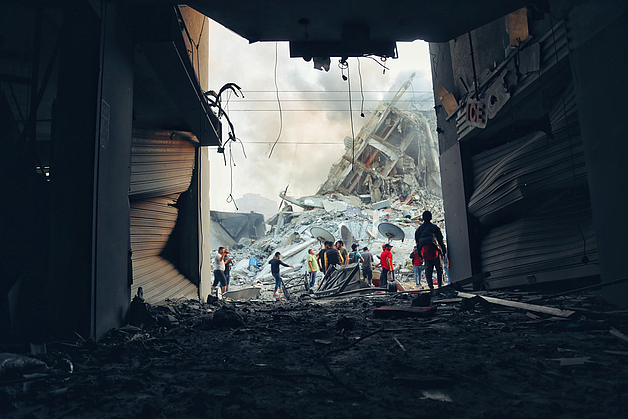 Destruction in Gaza following Israeli strike May 2021 © Photo by Mohammad Libed / OCHACairo, 1 June 2021 – As the ceasefire in the occupied Palestinian territory (oPt) holds, WHO is scaling up its response to provide health aid for almost 200 000 people in need. WHO has so far provided essential medicines to support trauma care and ambulance services for more than 2000 injured beneficiaries in the Gaza Strip, and 10 triage and treatment tents by WHO have been set up outside 6 Ministry of Health emergency departments, also in the Gaza Strip.
Destruction in Gaza following Israeli strike May 2021 © Photo by Mohammad Libed / OCHACairo, 1 June 2021 – As the ceasefire in the occupied Palestinian territory (oPt) holds, WHO is scaling up its response to provide health aid for almost 200 000 people in need. WHO has so far provided essential medicines to support trauma care and ambulance services for more than 2000 injured beneficiaries in the Gaza Strip, and 10 triage and treatment tents by WHO have been set up outside 6 Ministry of Health emergency departments, also in the Gaza Strip.
“The situation is volatile. WHO remains concerned about the situation in oPt and calls for unhindered access for humanitarian and development-related essential supplies and staff into Gaza and the referral of patients out of Gaza whenever needed,” said Dr Rik Peeperkorn, WHO Representative in oPt.
With COVID-19 still a persistent threat, WHO and UNICEF, through the COVAX Facility, have supported the delivery of more than 260 000 doses of COVID-19 vaccines to oPt, including 60 000 doses delivered today. As of 31 May 2021, 337 191 confirmed cases of COVID-19 and 3765 deaths have been reported, with positive cases increasing in Gaza in recent weeks. WHO has also provided essential medicines and consumables to East Jerusalem.
Earlier armed conflict in oPt sparked further population displacement and exacerbated a prolonged humanitarian crisis. Hostilities resulted in a loss of 278 Palestinian lives and over 9000 injuries. Over 77 000 people were internally displaced and around 30 health facilities have been damaged. Around 600 referral patients were affected due to closure of the crossings during the escalation of hostilities.
On 20 May, WHO launched an appeal for US$ 7 million to support its health operations for the next 6 months, focusing on trauma and emergency care, mental health and psychosocial services, advocacy, and maintaining essential health services, including for COVID-19. To date, US$ 2.3 million has been received from the US$ 7 million appeal.
“Palestinians’ lives are deteriorating; many of the people affected by the conflict are in urgent need of aid and face other health threats like COVID-19. WHO is working to support the Palestinian health system and its partners in its emergency humanitarian response and calls for the support of the international community in these efforts,” said Dr Rik Peeperkorn.








